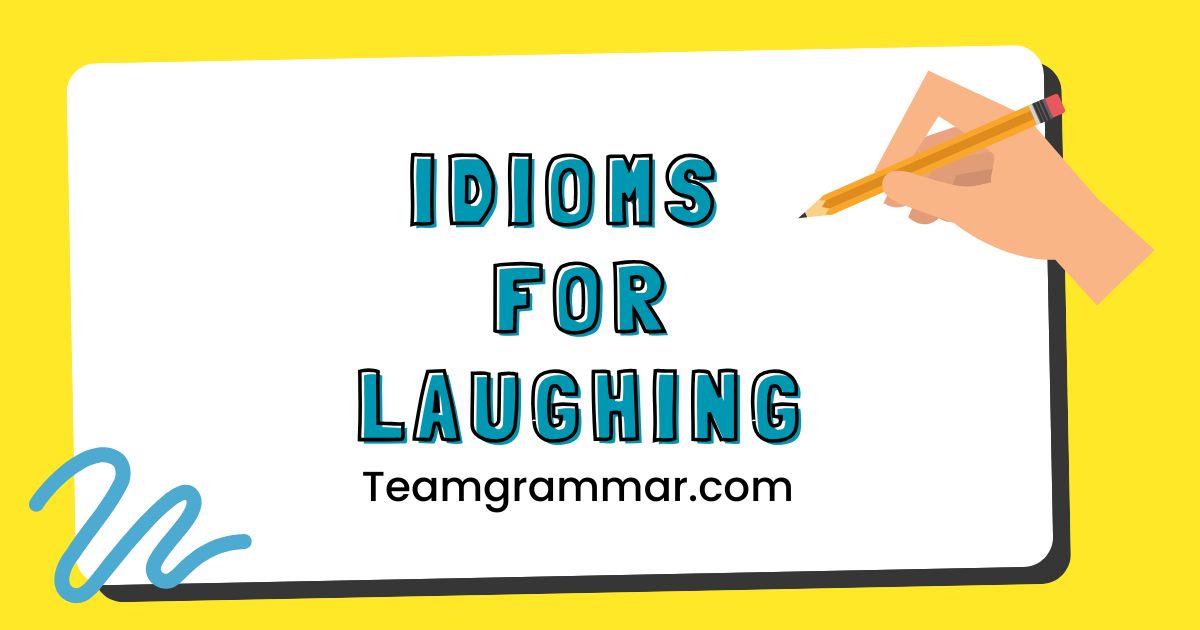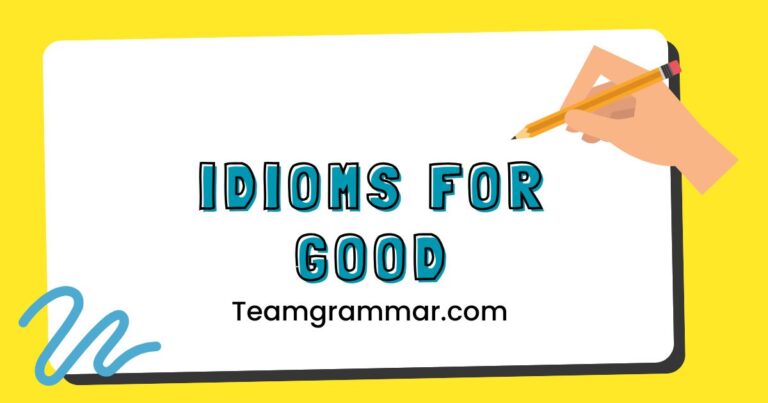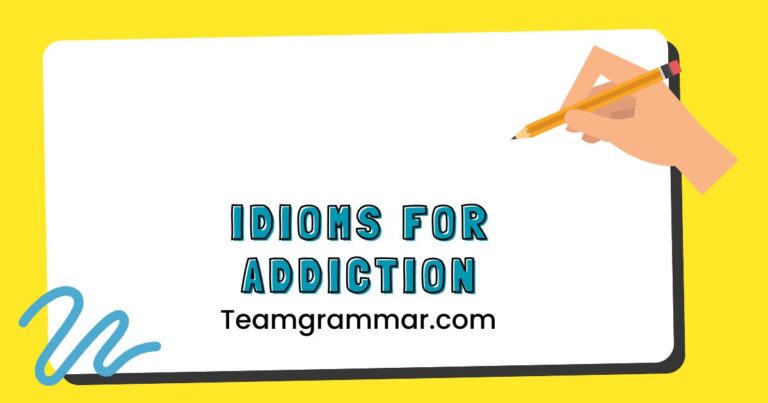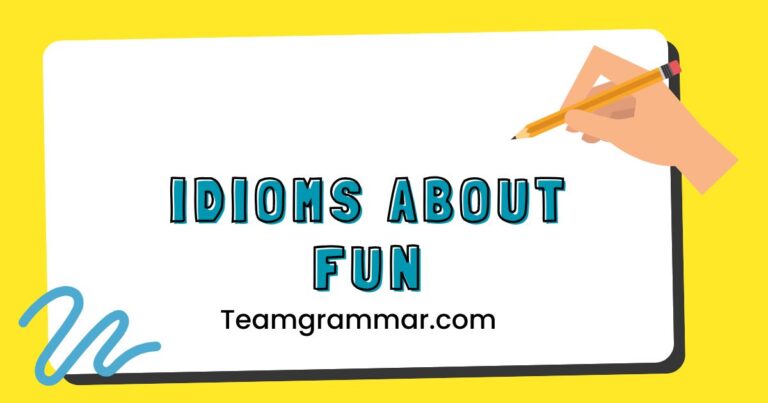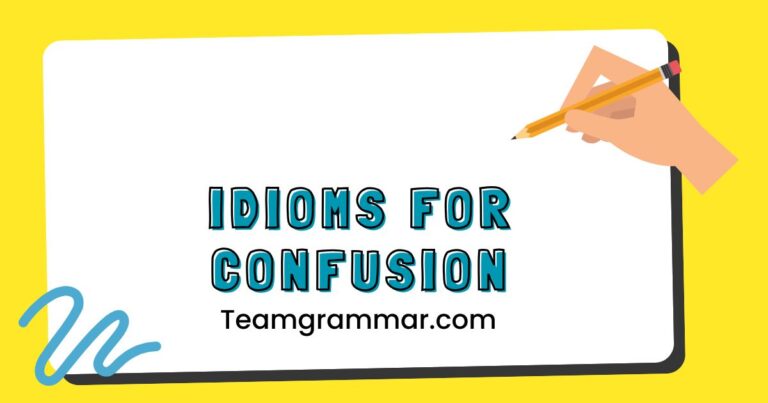49 Idioms for Laughing: Mastering Humorous Expressions
Understanding idioms is crucial for mastering English, as they add color and depth to communication. Specifically, idioms related to laughter and humor are vital for grasping the nuances of informal conversations and comedic contexts.
This article delves into the world of these idioms, exploring their meanings, origins, and usage, benefiting English language learners, teachers, and anyone interested in enriching their vocabulary and comprehension of English humor.
Table of Contents
- Introduction
- Definition of Idioms for Laughing
- Structural Breakdown
- Types and Categories of Laughing Idioms
- Examples of Idioms for Laughing
- Usage Rules and Guidelines
- Common Mistakes to Avoid
- Practice Exercises
- Advanced Topics
- Frequently Asked Questions
- Conclusion
Definition of Idioms for Laughing
Idioms for laughing are expressions that use figurative language to describe the act of laughing, the reasons for laughter, or the state of being amused. These idioms often carry a cultural context and are not meant to be taken literally.
Understanding them requires familiarity with the nuances of the English language and the situations in which they are typically used.
Anidiomis a phrase or expression whose meaning cannot be understood from the literal meanings of its individual words. Instead, the phrase has a figurative meaning that is known through common usage.
Idioms related to laughter describe various aspects of humor, amusement, and the physical act of laughing. They enrich conversations and add a layer of expressiveness beyond simple vocabulary.
These idioms can be classified based on their function: describing the intensity of laughter, the cause of laughter, the manner of laughter, or the general state of being amused. Each category offers a different perspective on how laughter and humor are expressed in the English language.
The context in which these idioms are used is crucial for understanding their intended meaning and impact. Using them correctly enhances communication and provides a deeper understanding of English-speaking cultures.
Structural Breakdown
The structure of idioms for laughing varies, but they often include a verb related to laughter or amusement combined with other words to create a figurative meaning. They can involve nouns, adjectives, or adverbs that modify the verb, providing additional context or emphasis.
Most idioms consist of a fixed structure, meaning the words cannot be changed or rearranged without altering the idiom’s meaning or making it nonsensical. For example, “rolling in the aisles” is a fixed phrase that cannot be changed to “rolling on the seats” without losing its idiomatic meaning.
The structural elements often contribute to the image or metaphor being conveyed, such as “dying of laughter,” which uses the extreme image of death to describe intense amusement.
Some idioms follow common grammatical patterns, while others are unique in their construction. The key is to recognize the phrase as a unit of meaning rather than analyzing it word by word.
Understanding the structural elements helps in identifying and remembering different idioms. For instance, many idioms use hyperbole (exaggeration) to emphasize the level of amusement or laughter, contributing to their expressive power.
Types and Categories of Laughing Idioms
Idioms for laughing can be categorized based on what aspect of laughter they describe. This classification helps in understanding the nuances and contexts in which each idiom is used.
Idioms Describing Intensity of Laughter
These idioms describe how strong or intense the laughter is. They often use exaggerated or dramatic language to convey extreme amusement.
Idioms Describing Cause of Laughter
These idioms indicate what made someone laugh or what is considered funny. They often refer to specific situations or types of humor.
Idioms Describing Manner of Laughter
These idioms describe how someone laughs, focusing on the style or way in which they express their amusement. They can include descriptions of the sound or physical actions associated with laughter.
Idioms Describing a State of Amusement
These idioms describe the overall state of being amused or entertained, often indicating a sustained or prolonged period of enjoyment.
Examples of Idioms for Laughing
The following sections provide examples of idioms for laughing, categorized by the aspect of laughter they describe. Each example is accompanied by a definition and a sample sentence to illustrate its usage.
Examples Describing Intensity of Laughter
This table provides examples of idioms that describe the intensity of laughter, highlighting just how funny something is considered to be.
| Idiom | Definition | Example Sentence |
|---|---|---|
| Rolling in the aisles | Laughing uncontrollably, often to the point of physical movement. | The comedian had the audience rolling in the aisles with his hilarious jokes. |
| Dying of laughter | Laughing so hard that it feels like one is about to die. | We were dying of laughter watching the bloopers from the movie. |
| In stitches | Laughing uncontrollably, as if one’s sides are hurting. | The stand-up routine had everyone in stitches. |
| Belly laugh | A deep, hearty laugh that comes from the stomach. | His joke elicited a belly laugh from the entire room. |
| Laugh your head off | To laugh very loudly and heartily. | I laughed my head off when I saw him trip and fall. |
| Crack up | To suddenly burst into laughter. | The whole class cracked up when the teacher told a funny story. |
| Roar with laughter | To laugh very loudly and powerfully. | The audience roared with laughter at the comedian’s punchline. |
| Howl with laughter | To laugh loudly and unrestrainedly. | We howled with laughter at his ridiculous impersonations. |
| Burst out laughing | To suddenly start laughing. | She burst out laughing when she saw his new haircut. |
| Double up with laughter | To bend over with laughter, often holding one’s stomach. | He doubled up with laughter at the silly antics on stage. |
| Split your sides | To laugh so much that your stomach muscles hurt. | That movie was so funny, I thought I was going to split my sides. |
| Be convulsed with laughter | To laugh uncontrollably, with physical shaking. | The children were convulsed with laughter watching the clown. |
| Fall about laughing | To laugh uncontrollably, often falling or stumbling. | We fell about laughing at his clumsy attempt to dance. |
| Nearly wet oneself laughing | To laugh so much that one almost loses control of their bladder (humorous exaggeration). | His jokes were so funny, I nearly wet myself laughing. |
| In fits of laughter | Laughing uncontrollably for a period of time. | They were in fits of laughter after hearing the absurd story. |
| Chuckle your socks off | To laugh heartily and with great amusement. | The cartoon was so hilarious, I chuckled my socks off. |
| Guffaw | A loud, unrestrained burst of laughter. | His unexpected joke caused a hearty guffaw from the crowd. |
| Tear up with laughter | To laugh so much that tears come to your eyes. | The movie was so funny I teared up with laughter. |
| Sidesplitting | Extremely funny; causing uncontrollable laughter. | The comedian’s routine was absolutely sidesplitting. |
| Hilarious | Extremely amusing; causing great laughter. | That sitcom is absolutely hilarious. |
| Comical | Amusing in a strange or unexpected way. | The actor’s comical movements made the scene very funny. |
| Killing yourself laughing | Laughing extremely hard. | I was killing myself laughing at the meme I saw online. |
| Slapstick | Comedy based on deliberately clumsy or funny actions and embarrassing events. | The show was filled with slapstick comedy and silly antics. |
| To be a scream | To be very funny. | That stand-up comedian is a scream. |
| To be the death of someone | To be extremely funny (humorous exaggeration). | This story is the death of me! |
| To be a laugh a minute | To be full of funny moments. | The class was a laugh a minute with that teacher. |
Examples Describing Cause of Laughter
This table focuses on idioms that describe what causes laughter, providing context for the humor.
| Idiom | Definition | Example Sentence |
|---|---|---|
| A barrel of laughs | A person or situation that is very funny. | Spending the evening with him was a barrel of laughs. |
| A laugh a minute | Full of funny moments or incidents. | The party was a laugh a minute, with everyone telling jokes. |
| A source of amusement | Something or someone that causes laughter or entertainment. | His clumsy attempts at cooking were a constant source of amusement for his family. |
| Comedy of errors | A situation full of mistakes and mishaps that are funny because they are so ridiculous. | The whole trip turned into a comedy of errors, but we still enjoyed it. |
| Make someone’s day | To do something that makes someone feel happy or amused. | Her funny comment really made my day. |
| Tickle someone’s funny bone | To appeal to someone’s sense of humor. | The comedian knows exactly how to tickle the audience’s funny bone. |
| Be a riot | To be very funny or entertaining. | The clown at the circus was a riot. |
| A hoot | Something that is very funny or enjoyable. | The party was a real hoot. |
| A knee-slapper | A joke or story that is extremely funny. | He told a knee-slapper that had everyone laughing. |
| A sidesplitter | Something very funny. | The play was a real sidesplitter. |
| A card | A funny or eccentric person. | He’s quite a card; always making us laugh. |
| A caution | Someone or something amusing or remarkable. | That dog is a real caution, always getting into trouble. |
| A scream | Someone or something very funny. | That comedian is a scream. |
| A joke | Something that causes laughter; a funny story or situation. | His attempt to fix the car was a joke. |
| A laugh | Something amusing or funny. | The whole situation was a laugh. |
| Be the life of the party | To be the most amusing or entertaining person at a gathering. | He’s always the life of the party. |
| A bundle of laughs | A person who is very funny and enjoyable to be around. | She’s a bundle of laughs; always making us smile. |
| A clown | Someone who is deliberately funny or silly. | He’s such a clown; always joking around. |
| A comedian | A professional entertainer who tells jokes and performs comedy. | The comedian had the audience in stitches. |
| A wag | A humorous or witty person. | He’s a bit of a wag; always cracking jokes. |
| A wit | Someone who is skilled at making clever and amusing remarks. | She’s known for her quick wit. |
| Be a hit | To be very popular or successful; often used to describe something that causes amusement. | The new comedy show was a hit with audiences. |
| Be a crowd-pleaser | To be something that is enjoyed by a large group of people. | The comedian was a crowd-pleaser. |
| To be the talk of the town | To be the subject of much conversation or gossip, often due to something amusing. | His antics became the talk of the town. |
| To be the highlight of the evening | To be the most enjoyable or memorable part of an event. | The comedian’s performance was the highlight of the evening. |
Examples Describing Manner of Laughter
This table showcases idioms that describe how someone laughs, focusing on the style and expression of their amusement.
| Idiom | Definition | Example Sentence |
|---|---|---|
| Giggle | To laugh in a nervous or childish way. | The girls giggled when they saw the cute boy. |
| Snicker | To laugh quietly in a disrespectful way. | He snickered at her mistake. |
| Chuckle | To laugh quietly to oneself. | He chuckled at the memory. |
| Titter | To give a short, suppressed laugh; giggle. | The audience tittered at the suggestive joke. |
| Cackle | To laugh in a loud, harsh way. | The witch cackled as she stirred the potion. |
| Roar | To laugh very loudly. | The audience roared with laughter. |
| Guffaw | To laugh in a loud, boisterous way. | He let out a hearty guffaw. |
| Tee-hee | To laugh in a silly or affected way. | She tee-heed at his compliment. |
| Snort | To make a sudden, explosive sound through the nose, often when laughing. | He snorted with laughter. |
| Yelp | To give a sudden, sharp cry or laugh. | She yelped with laughter when he tickled her. |
| Hoot | To laugh loudly and joyfully. | The audience hooted with laughter at the comedian’s jokes. |
| Simper | To smile or laugh in a silly, self-conscious way. | She simpered at his attention. |
| Beam | To smile radiantly with happiness or amusement. | He beamed with pride at her achievement. |
| Grin | To smile broadly, showing teeth. | He grinned at her joke. |
| Smirk | To smile in a smug or knowing way. | He smirked at his rival’s misfortune. |
| Chortle | To chuckle with delight. | He chortled at the silly cartoon. |
| Crow | To express pleasure or triumph, often loudly. | He crowed with delight at winning the game. |
| Bray | To laugh loudly and harshly, like a donkey. | He brayed with laughter at the absurd situation. |
| Scoff | To laugh at someone or something in a way that shows you think they are stupid or ridiculous. | He scoffed at her suggestion. |
| Snigger | To laugh in a suppressed or disrespectful way. | The boys sniggered at the teacher’s mistake. |
| Crackle | To laugh with a series of short, sharp sounds. | His voice crackled with laughter as he told the story. |
| Tee-hee | To giggle in a high-pitched, affected manner. | She tee-heed at his compliment. |
| Guffaw | To laugh loudly and heartily. | His joke was met with a hearty guffaw. |
| Hee-haw | To laugh with a loud, braying sound. | They hee-hawed at his clumsy attempt to dance. |
| Titter | To give a short, nervous laugh. | The audience tittered at the risqué joke. |
Examples Describing a State of Amusement
This table presents idioms that describe the overall state of being amused or entertained.
| Idiom | Definition | Example Sentence |
|---|---|---|
| In good spirits | In a happy and cheerful mood. | She was in good spirits after the successful presentation. |
| On cloud nine | Extremely happy and elated. | He was on cloud nine after winning the lottery. |
| Tickled pink | Very pleased and amused. | She was tickled pink by his thoughtful gift. |
| Over the moon | Extremely happy and delighted. | They were over the moon to hear about the engagement. |
| Happy as a clam | Very happy and content. | He was as happy as a clam living by the sea. |
| Full of glee | Filled with great delight and joy. | The children were full of glee on Christmas morning. |
| Grinning from ear to ear | Smiling very widely. | He was grinning from ear to ear after the good news. |
| Laughing all the way to the bank | Making a lot of money easily and happily. | He was laughing all the way to the bank after selling his company. |
| Having a whale of a time | Having a very good and enjoyable time. | We had a whale of a time at the party. |
| Living it up | Enjoying life to the fullest. | They were living it up on their vacation. |
| In stitches | Laughing uncontrollably. | The comedian had the audience in stitches. |
| In fits of laughter | Laughing uncontrollably for a period of time. | They were in fits of laughter after hearing the absurd story. |
| In hysterics | In a state of uncontrollable laughter or emotion. | She was in hysterics after hearing the joke. |
| Beside oneself with laughter | Overcome with laughter; unable to control oneself. | He was beside himself with laughter at the clown’s antics. |
| Tickled to death | Extremely amused or pleased. | She was tickled to death by his romantic gesture. |
| On top of the world | Feeling extremely happy and successful. | He was on top of the world after winning the championship. |
| Sitting pretty | In a favorable or advantageous position. | After the promotion, she was sitting pretty. |
| Happy camper | A person who is content and satisfied. | He’s a happy camper now that he has a new job. |
| Full of the joys of spring | Very happy and energetic. | She was full of the joys of spring on her birthday. |
| Grinning like a Cheshire cat | Smiling broadly and mysteriously. | He was grinning like a Cheshire cat after pulling the prank. |
Usage Rules and Guidelines
Using idioms correctly requires understanding both their meaning and the context in which they are appropriate. Here are some guidelines to follow:
- Understand the meaning: Make sure you know the figurative meaning of the idiom, not just the literal meaning of the individual words.
- Consider the context: Use idioms in situations where they fit the tone and style of the conversation or writing. Avoid using them in formal or serious contexts where they might be inappropriate.
- Be aware of cultural nuances: Some idioms are specific to certain cultures or regions. Be mindful of your audience and choose idioms that are widely understood.
- Practice using them: The best way to learn idioms is to practice using them in your own speech and writing. Pay attention to how native speakers use them and try to incorporate them into your vocabulary.
- Avoid overusing them: While idioms can add color to your language, using too many can make your speech sound unnatural or forced. Use them sparingly and appropriately.
It’s also important to note that some idioms have variations or alternative forms. Be aware of these variations and use the one that is most common or appropriate for the context.
For example, “rolling in the aisles” can also be expressed as “rolling in the aisles with laughter.”
Common Mistakes to Avoid
One of the most common mistakes is taking idioms literally. For example, someone might misunderstand “dying of laughter” to mean that someone actually died.
Another mistake is misusing idioms by changing the words or structure, which can alter the meaning or make the phrase nonsensical.
Here are some examples of common mistakes and their corrections:
| Incorrect | Correct | Explanation |
|---|---|---|
| I was death of laughter. | I was dying of laughter. | The correct idiom is “dying of laughter,” not “death of laughter.” |
| He made me laugh on my stomach. | He made me laugh my head off. | “Laugh my head off” is the correct idiom for laughing very hard. |
| She is a barrel of fun. | She is a barrel of laughs. | The correct idiom is “a barrel of laughs,” not “a barrel of fun.” |
| We had a whale of a time’s. | We had a whale of a time. | The idiom “whale of a time” doesn’t require a possessive. |
Another common error is using idioms in inappropriate contexts. For instance, using an informal idiom in a formal presentation can sound unprofessional.
Always consider your audience and the setting when using idioms.
Practice Exercises
Test your understanding of idioms for laughing with these exercises. Fill in the blanks with the correct idiom from the list provided.
Idiom List: rolling in the aisles, dying of laughter, in stitches, a barrel of laughs, tickled pink, laugh your head off, crack up, roar with laughter, a laugh a minute, split your sides
| Question | Answer |
|---|---|
| 1. The comedian had the audience ________ with his hilarious jokes. | rolling in the aisles |
| 2. We were ________ watching the bloopers from the movie. | dying of laughter |
| 3. The stand-up routine had everyone ________. | in stitches |
| 4. Spending the evening with him was ________. | a barrel of laughs |
| 5. She was ________ by his thoughtful gift. | tickled pink |
| 6. I ________ when I saw him trip and fall. | laughed my head off |
| 7. The whole class ________ when the teacher told a funny story. | crack up |
| 8. The audience ________ at the comedian’s punchline. | roar with laughter |
| 9. The party was ________, with everyone telling jokes. | a laugh a minute |
| 10. That movie was so funny, I thought I was going to ________. | split your sides |
Exercise 2: Match the idiom with its definition.
| Idiom | Definition | Answer |
|---|---|---|
| 1. A knee-slapper | A. Laughing uncontrollably | E |
| 2. Be a riot | B. Very pleased and amused | F |
| 3. On cloud nine | C. A situation full of mistakes and mishaps that are funny | H |
| 4. Comedy of errors | D. To appeal to someone’s sense of humor | G |
| 5. Rolling in the aisles | E. A joke or story that is extremely funny | A |
| 6. Tickled pink | F. To be very funny or entertaining | B |
| 7. Tickle someone’s funny bone | G. To appeal to someone’s sense of humor | D |
| 8. A comedy of errors | H. A situation full of mistakes and mishaps that are funny | C |
Advanced Topics
For advanced learners, exploring the origins and cultural contexts of idioms can provide a deeper understanding. Many idioms have historical roots or are derived from literature, folklore, or popular culture.
Understanding these origins can shed light on the nuances of their meaning and usage.
Another advanced topic is the use of idioms in literature and film. Authors and filmmakers often use idioms to create vivid imagery, develop characters, and add depth to their storytelling.
Analyzing how idioms are used in these contexts can enhance your comprehension and appreciation of English literature and cinema.
Furthermore, studying regional variations of idioms can be fascinating. Different English-speaking countries and regions often have their own unique idioms or variations of common idioms.
Learning these regional differences can improve your ability to communicate effectively with people from different backgrounds.
Frequently Asked Questions
- What is the difference between an idiom and a proverb?
An idiom is a phrase whose meaning cannot be understood from the literal meanings of its individual words, while a proverb is a short, well-known saying that expresses a general truth or piece of advice. Idioms focus on figurative language, whereas proverbs offer wisdom or guidance.
- How can I learn idioms more effectively?
Immerse yourself in the English language by reading books, watching movies, and listening to podcasts. Pay attention to how native speakers use idioms in conversations. Keep a notebook of new idioms and their meanings, and practice using them in your own speech and writing. Flashcards and language learning apps can also be helpful.
- Are there any online resources for learning idioms?
Yes, there are many online resources, including dictionaries, websites, and apps dedicated to idioms. Some popular resources include the Oxford Learner’s Dictionaries, Merriam-Webster’s online dictionary, and various language learning apps that offer idiom lessons and quizzes. Look for resources that provide context and examples of usage.
- Is it okay to use idioms in formal writing?
Generally, it’s best to avoid using idioms in formal writing, as they are often considered informal or colloquial. Formal writing requires precise and clear language, and idioms can sometimes be ambiguous or open to interpretation. However, there may be exceptions in creative writing or when trying to achieve a specific stylistic effect.
- How do I know when to use an idiom?
Consider the context, audience, and purpose of your communication. Idioms are most appropriate in informal settings, such as conversations with friends or family, or in creative writing where you want to add color and expressiveness to your language. Avoid using them in formal presentations, academic papers, or business reports.
- Can idioms have different meanings in different cultures?
Yes, idioms can have different meanings or be completely unknown in different cultures. It’s important to be aware of cultural nuances and avoid using idioms that might be offensive or misunderstood by your audience. When in doubt, it’s best to use more straightforward language.
- How can I avoid misusing idioms?
Study the meaning and usage of each idiom carefully. Pay attention to the specific words and structure of the phrase, and avoid changing them. Practice using idioms in context, and ask native speakers for feedback on your usage. If you’re unsure about an idiom, it’s better to use a simpler alternative.
- What are some common mistakes to avoid when using idioms?
Common mistakes include taking idioms literally, changing the words or structure of the phrase, using idioms in inappropriate contexts, and overusing idioms. To avoid these mistakes, focus on understanding the figurative meaning of each idiom, practicing their usage in context, and being mindful of your audience and purpose.
- Are there any idioms that are considered offensive?
Yes, some idioms can be considered offensive, particularly if they are based on stereotypes or discriminatory language. It’s important to be aware of the potential impact of your words and avoid using idioms that could be hurtful or offensive to others. When in doubt, it’s best to choose more neutral language.
- How do I explain an idiom to someone who doesn’t understand it?
Start by explaining the literal meaning of the words in the idiom, and then explain the figurative meaning. Provide context and examples of how the idiom is used in different situations. You can also use visual aids or analogies to help the person understand the concept. Be patient and willing to answer their questions.
Conclusion
Mastering idioms for laughing is an essential step in becoming fluent in English. These expressions add richness and color to your language, allowing you to express humor and amusement in a more nuanced and engaging way.
By understanding the meanings, origins, and usage of these idioms, you can enhance your communication skills and connect with native speakers on a deeper level.
Remember to practice using idioms in your own speech and writing, and pay attention to how they are used in real-life contexts. Be mindful of cultural nuances and avoid using idioms that might be misunderstood or offensive.
With consistent effort and attention, you can master idioms for laughing and unlock a new level of expressiveness in your English language skills. Keep exploring,
Keep exploring, keep practicing, and soon you’ll have everyone “rolling in the aisles” with your mastery of humorous English expressions!

